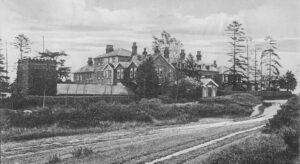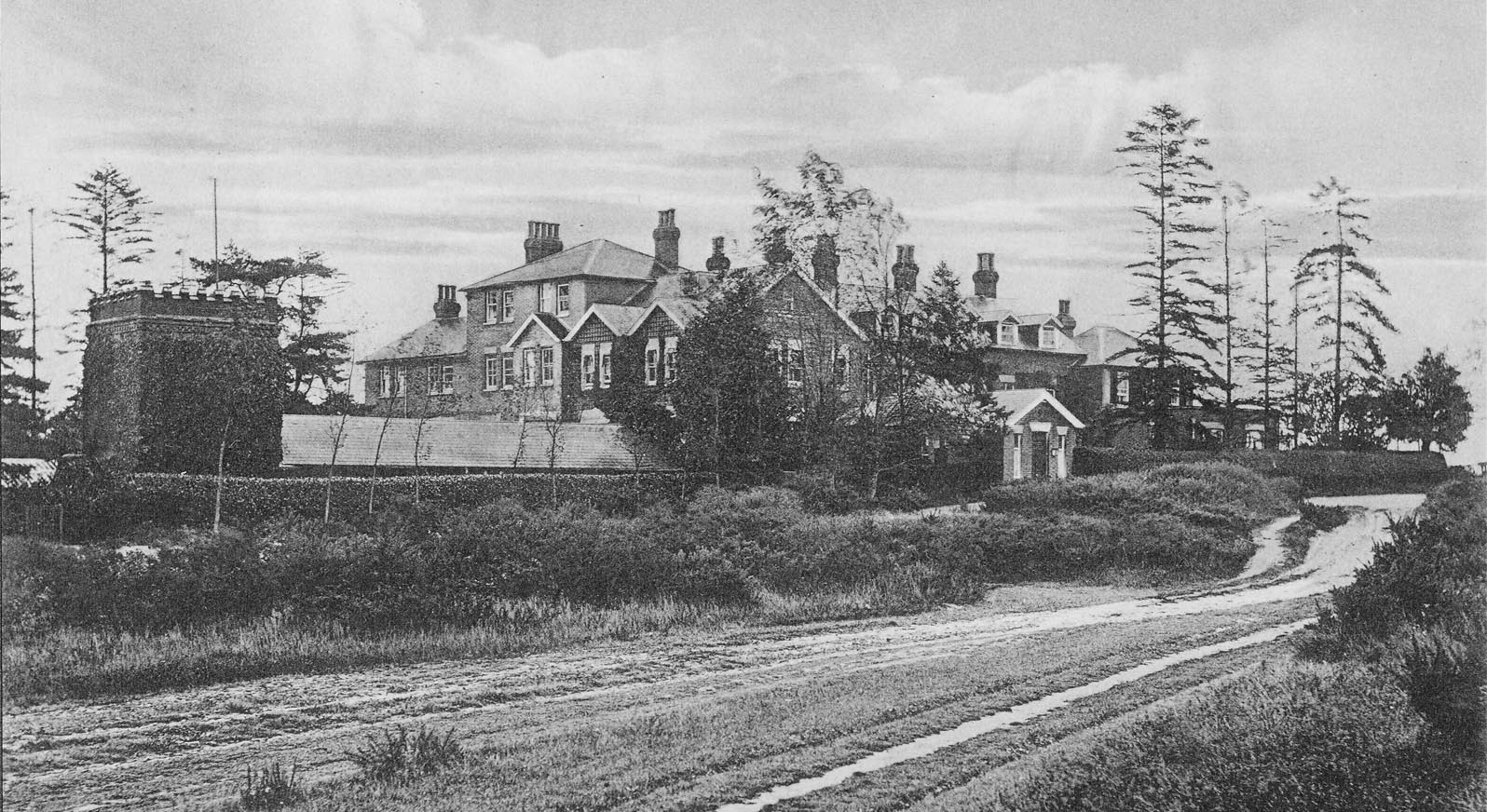
Emsworth House
Source: Copthorne Prep
William Haycock M.R.C.V.S. (1818 – 15 November 1872) was an orthodox veterinary surgeon who converted to homeopathy in 1850. In 1852, Haycock advocated veterinary homeopathy as a protest against the violent practices of bleeding and purging.
Haycock was a member, vice-president, and President of the Lancashire Veterinary Medical Association.
William Haycock was a colleague of veterinary homeopath William Charles Lord and Huddersfield homeopathic physician John Hodgson Ramsbotham, among others.
William Haycock practiced at King Street, Huddersfield, and at the Veterinary Institution, West Parade, Huddersfield. He later practiced at 3 Moreton Street, Strangeways, Manchester.
William Haycock was born in Harworth, Nottinghamshire in 1818, the son of blacksmith Thomas Haycock and Mary Haycock.
In 1842, Haycock was admitted as a member of Edinburgh Veterinary College, founded in 1819 by Professor William Dick. Another new member of the College at that time was future homeopathic veterinary surgeon, William Charles Lord.
Around 1850, Huddersfield homeopath John Hodgson Ramsbotham introduced Haycock to homeopathy. In gratitude, Haycock dedicated his 1852 book, Elements of Veterinary Homoeopathy, to Ramsbotham:
My Dear Sir,
I do not know any one to whom I can more appropriately dedicate this volume than yourself. Had it not been for your talent and zeal in promulgating the cause of Homoeopathy, it is more than probable that this treatise would never have been called into existence. For a long time I regarded both the system and its supporters with every possible kind of distrust. I refused to investigate it experimentally, until at last the facts in its favour became so numerous, and the evidence of its truth so over-whelming, that, as an honest inquirer, I could not longer refuse to examine its claims. I did so, and the result was such as fully convinced me that the new doctrine was one not to be silenced by ridicule, nor yet put down by the mere force of sophistical arguments. A still further inquiry enabled me to clearly perceive its immense superiority over the old mode of treatment in the majority of equine diseases. From that time to the present, I have diligently availed myself of its principles and therapeutical resources to the relief of those patients entrusted to my care. In conclusion, I cannot but express my thanks for the readiness you manifested in aiding me in my early investigations; and that you may long live to spread Homoeopathy, and to confer its blessings upon your afflicted fellow-creatures, is the ardent and sincere wish of
THE AUTHOR, Veterinary Institution, West Parade, Huddersfield, Aug. 30, 1852.
In 1851, army officer Captain Edward Charles Warde consulted Haycock, then a homeopathic veterinarian in Huddersfield, to attend one of his horses which, recovering from influenza, was now suffering from difficulty in breathing. William Haycock treated the horse with arsenicum and sulphur and the horse recovered.
Shortly thereafter, Haycock was entrusted by Warde, with the complete homeopathic management of all of the horses belonging to C Troop, Royal Horse Artillery, at the Leeds Barracks.
Edward Charles Warde subsequently provided William Haycock with the following testimonial:
“There were some acute and very dangerous cases, others of chronic character, and I have no hesitation in testifying to the perfect and complete success of your treatment under both circumstances.
“I have amply tested this system in my own stables for many years, and am perfectly satisfied of its vast superiority over the old mode of veterinary treatment in every way.
“You are at liberty to make any use you may think proper of this, and, I am, your sincere well wisher. Edward Charles Warde, Captain, Royal Horse Artillery, Woolwich, May 18th 1853.”
In 1856, Manchester homeopathic chemist Henry Turner published a book, The Lung Disease of Cattle; or Pleuro Pneumonia Cured by Homeopathy, in which he discussed some work done by William Haycock, George Edward Allshorn, Charles W Luther, and John Rush, who also had experience treating this disease homeoapthically.
Farmers had been losing thousands of cattle to this disease. Charles William Luther estimated that 6 out of every 10 cattle so affected could be cured homeopathically. Another homeopath, Peter Stuart, treated up to 180 cows suffering from the disease using homeopathy, saving about 130 of them. George Edward Allshorn used Aconite and Bryonia and estimated he had saved 17 out of every 20 cows he treated.
Haycock provided the forward, and the following title page quote, for Turner’s book:
“Considerable experience, in Veterinary Practice has proved to me the great value of Homoeopathy, over the Old System of medicine. It cures disease more quickly, it does so without leaving any injurious effects upon the constitutional powers; it saves more animals and it costs less.”
Two years later, in 1858, Haycock’s embrace of homeopathy was diminished in a review by the British and Foreign Medico-Chirurgical Review of Haycock’s book, Treatise on the Principles and Practice of Veterinary Medicine & Surgery. The review commended the book, except for Haycock’s “coquets with homeopathy,” offensively suggesting that his inclusion of homeopathic treatments was done “with a view to captivating the wealthy supporters of the sect who may also be the proprietors of large studs and stables.”
Haycock wrote a number of books on veterinary medicine, and also contributed articles to various homeopathic and veterinary publications.
After leaving Huddersfield, William Haycock practiced for many years in Lancashire. His address was listed in the 1873 Homœopathic Medical Directory of Great Britain and Ireland as 3 Moreton Street, Strangeways, Manchester. However, it appears that in the previous year, 1872, Haycock and his family had moved south to Surrey, presumably on account of the ill-health that had forced him to retire from veterinary work.
William Haycock died on 15 November 1872 at his new home, Emsworth House, in Copthorne, Surrey.
Select Publications:
- Elements of Veterinary Homoeopathy (1852)
- On Hysteria in the Mare (1854)
- Treatise on the Principles and Practice of Veterinary Medicine & Surgery (1858)
- The Gentleman’s Stable Manual (1859)
- On the Education and Training of the Veterinary Pupil (1866)
- Horses, How They Ought to be Shod: Being a Plain and Practical Treatise on the Principles and Practice of the Farrier’s Art (1869)



Leave A Comment